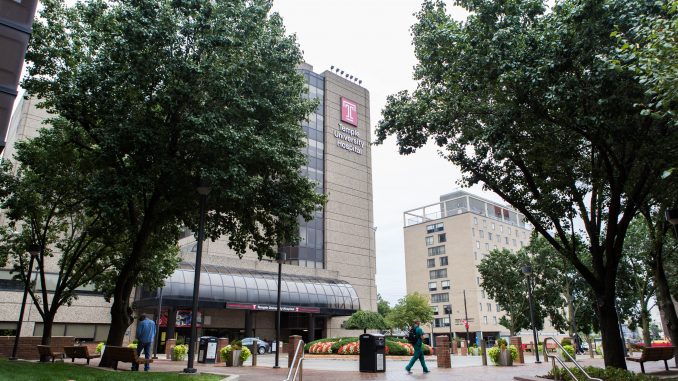
Temple University Hospital is partnering with researchers from the Penn State Health Milton S. Hershey Medical Center and the University of Pittsburgh Medical Center in a $13 million study to see how effective exercise programs are in preventing the elderly from sustaining injuries and increasing their overall health.
Professor and primary care doctor at the Hershey Medical Center Dr. Christopher Sciamanna is leading the 36-month trial, which is called “Working to Increase Stability Through Exercise.” This program will test if regularly scheduled exercise programs can strengthen participants’ bones or help prevent them from sustaining injuries if they fall. The study will also examine if the exercise program has an effect on mental health.
“People over 65 must pay for things necessary to improve health,” Sciamanna said. “They pay for medicine but not exercise.”
Temple’s location is also another factor as to why the trial is being conducted in the urban area.
“Temple University brings a different population compared to what you would find in the middle of the state,” said Dr. Anuradha Paranjape, the site’s principal investigator who is leading the study at TUH.
TUH enrolled 52 North Philadelphia residents over the age of 65 in the trial who have broken a bone in the last 10 years using hospital records to find participants, Sciamanna added. TUH hopes to enroll 200 patients in the trial.
Across all sites, the program’s goal enrollment is 2,100 people with 900 at Pitt and the remaining participants at Penn State.
Participants of the study do chest presses, shoulder presses and bicep curls. They also utilize resistance bands that wrap around their knees and help with leg workouts.
“Studies show that if people do strength training, they can double their strength in 12 weeks,” Sciamanna said. “Your ability to do things as you age depends on whether or not you choose to stay active.”
All participants have access to the same exercise program. TUH has been communicating with other involved medical centers for updates on the trial’s progression. A database allows the medical centers to share data from the trials.
In the TUH trial, volunteers have been leading the exercise programs at churches and local community centers. There are currently 10 locations of operation for TUH, including the Center in the Park community center in Germantown and a Jewish Community Center in the Northeast.
Paranjape said she hopes that the evidence found through the study will lead to changes in Medicare coverage, the federal health insurance program for people 65 and older.
The trial is funded by a grant from the Patient-Centered Outcomes Research Institute, which is funded by the Affordable Care Act and Medicare.
After the grant money is finished and the research is conducted, the program would fully rely on Medicare to keep costs low for senior citizens to continue.
“The goal is to demonstrate that [the program] works, and then we will need a mechanism to pay for it,” Paranjape said.
Sciamanna added that this program helps combat the “epidemic of loneliness in America” by offering older adults a place to socialize.
“If we do strength exercises, we take 60-second rests, which allows everyone to make conversation and meet new people,” Sciamanna said. “We’re doing it to measure [the program’s] effect on loneliness and depression, and we’ve heard positive stories about the results.”
“Fairly quickly, it becomes a new group of friends for people, and they enjoy their time together,” he added.



Be the first to comment